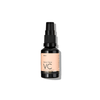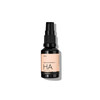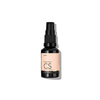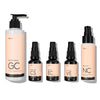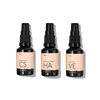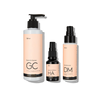Unlocking the Secret: Harness the Power of Facial Oils for Your Oily Skin
Understanding different skin types and how to care for them can be a complex task. Oily skin, characterised by an abundance of natural oils (sebum), often leaves individuals with a shiny complexion and enlarged pores. This skin type might seem bothersome, but on the bright side, it can be a remarkable anti-aging ally. The key is learning how to work with your oily skin type rather than against it. One potentially surprising strategy for managing oily skin is incorporating facial oils into your skincare routine. Add something oily to oily skin? Bear with us.

Facial oils can be a godsend for oily skin types, aiding in balancing the naturally occurring oils on the skin's surface. In addition to balancing, they offer calming, healing, and anti-inflammatory properties. They can also play an important role in hydrating the skin, an often overlooked need in oily skin care.
Understanding Oily Skin
Oily skin is typically distinguished by a dull, shiny complexion, enlarged pores, and frequent blackheads and blemishes. This skin type stems from an overproduction of sebum within the sebaceous gland. Several factors can contribute to this overproduction, including hormonal influences (predominantly testosterone) and genetics.
Environmental aspects, such as living in humid, tropical climates, can intensify oil production. Additionally, the excessive use of harsh, drying skincare products can provoke the skin to produce more oil as a defense mechanism.
Facial Oils and Their Role in Oily Skin Care
The concept of applying more oil to already oily skin may seem counterproductive. However, this is a common misconception. The oils used in skincare formulations differ fundamentally from the natural oils produced by the sebaceous gland.
Facial oils serve to alleviate skin dehydration and form a barrier to prevent excessive water loss from the skin's surface. Derived from various natural sources like plants, seeds, and nuts, these oils hydrate, soothe, and provide antioxidant protection to the skin.
Contrastingly, the sebum produced by the skin's sebaceous glands is a blend of squalene, cholesterols, triglycerides, and wax esters. This sebum acts as a protective layer, keeping the skin lubricated and healthy.
Integrating Facial Oils into an Oily Skin Routine
If you're considering adding facial oils to your skincare routine, choosing a lightweight, non-comedogenic formulation is crucial. Ingredients to look for include jojoba, evening primrose, tocopherol (vitamin E), and squalene, which is naturally present within the skin's sebum. It's also advised to introduce the facial oil gradually into your routine.
Facial Oils and Acne-Prone Skin: A Cautionary Note
It's worth distinguishing between oily skin and acne-prone or acnegenic skin. For those dealing with severe skin issues, like cystic acne or nodules, facial oils may not be the best choice. These skin conditions usually necessitate more targeted treatments or medications due to the complexity of the underlying skin imbalances. It is always advisable to consult with a dermatologist before making substantial changes to your skincare regimen.
Top-Notch Facial Oils for Oily Skin
As you navigate your skincare journey, remember you're not alone. Fether's range of all-natural and vegan skincare products has you covered. With a holistic approach to skincare, each product is carefully crafted with the finest natural ingredients to help balance, soothe, and enhance your skin's natural glow. From facial oils for oily skin to gentle cleansers and rejuvenating serums, Fether is your one-stop destination for achieving healthier, radiant skin, naturally.
